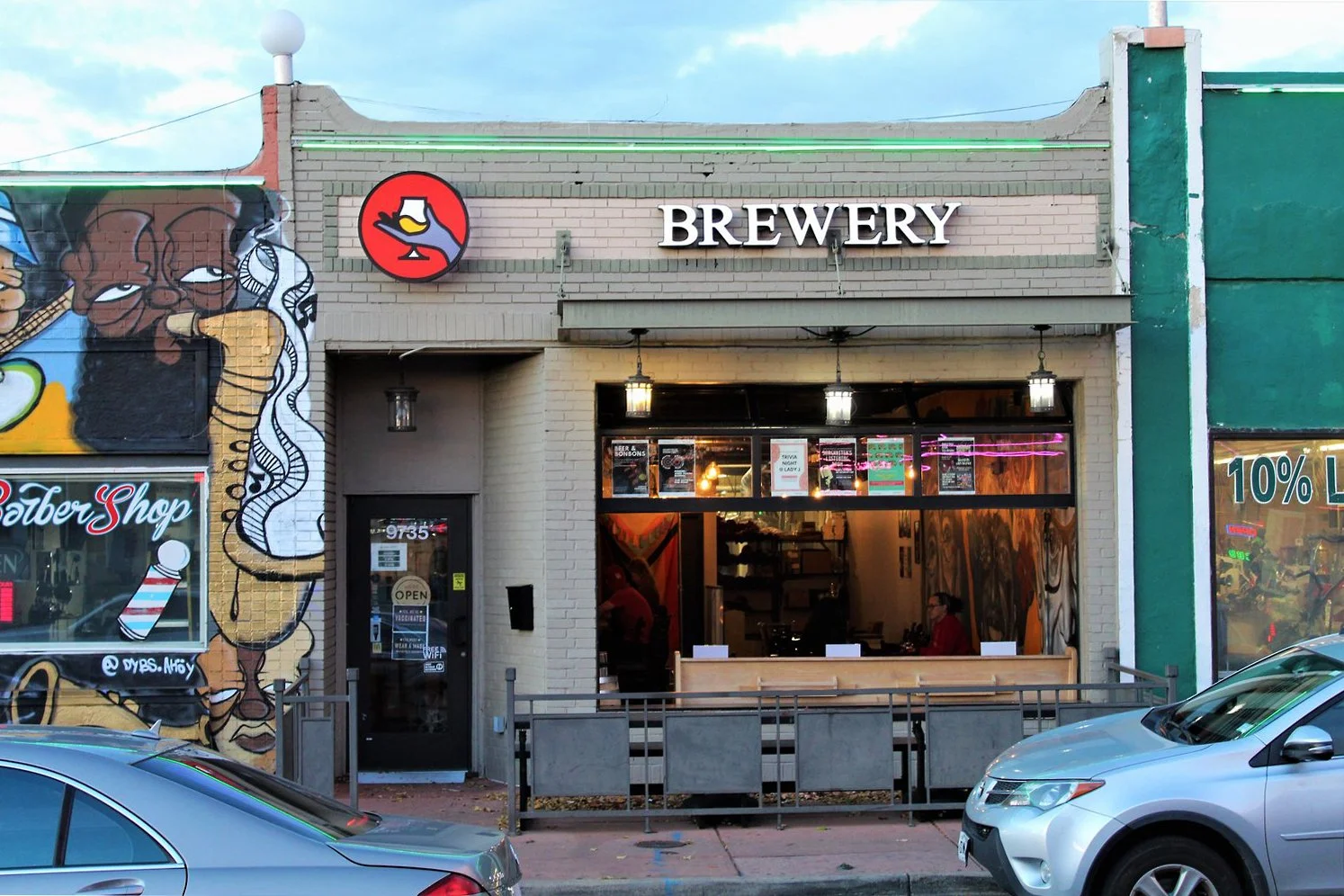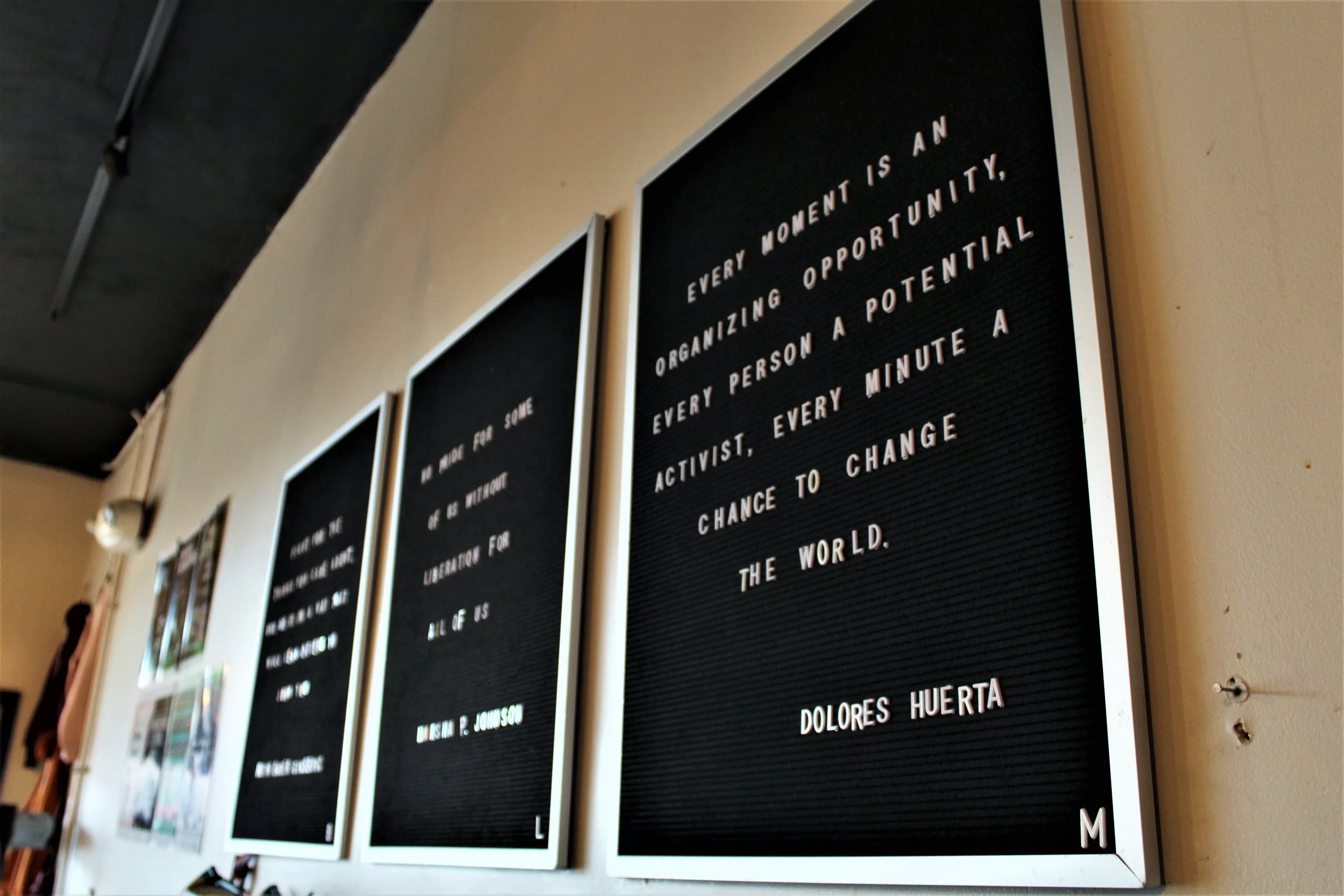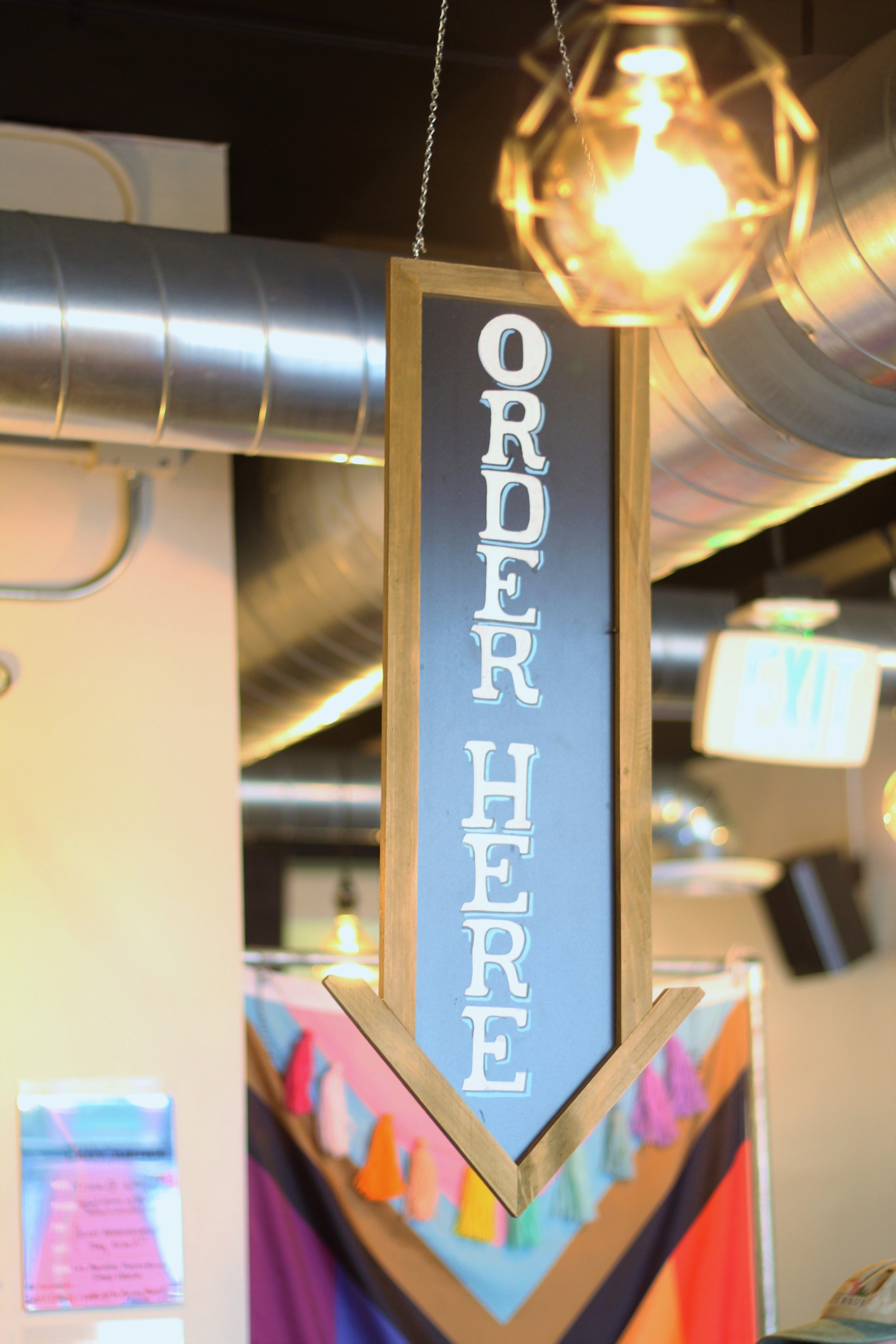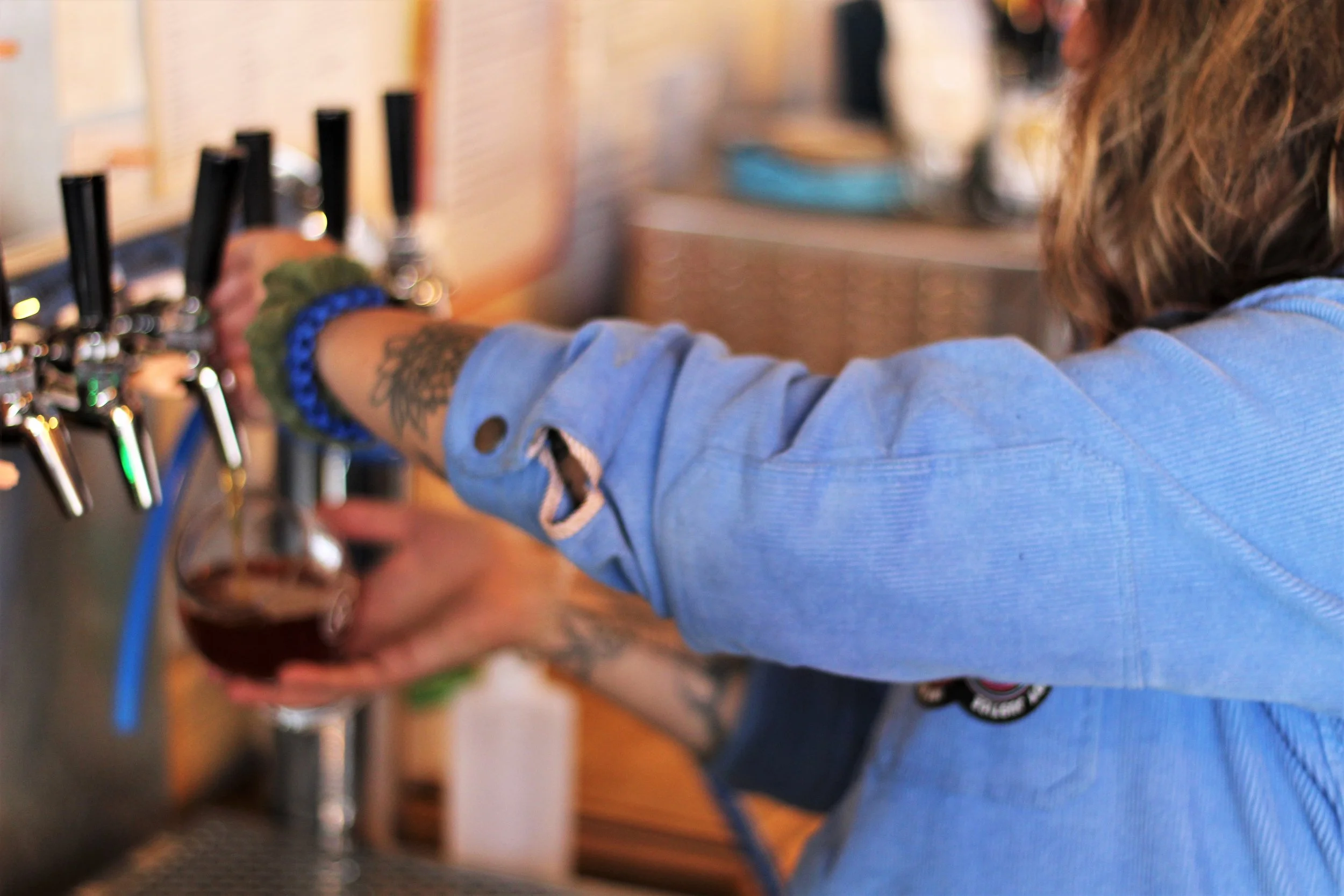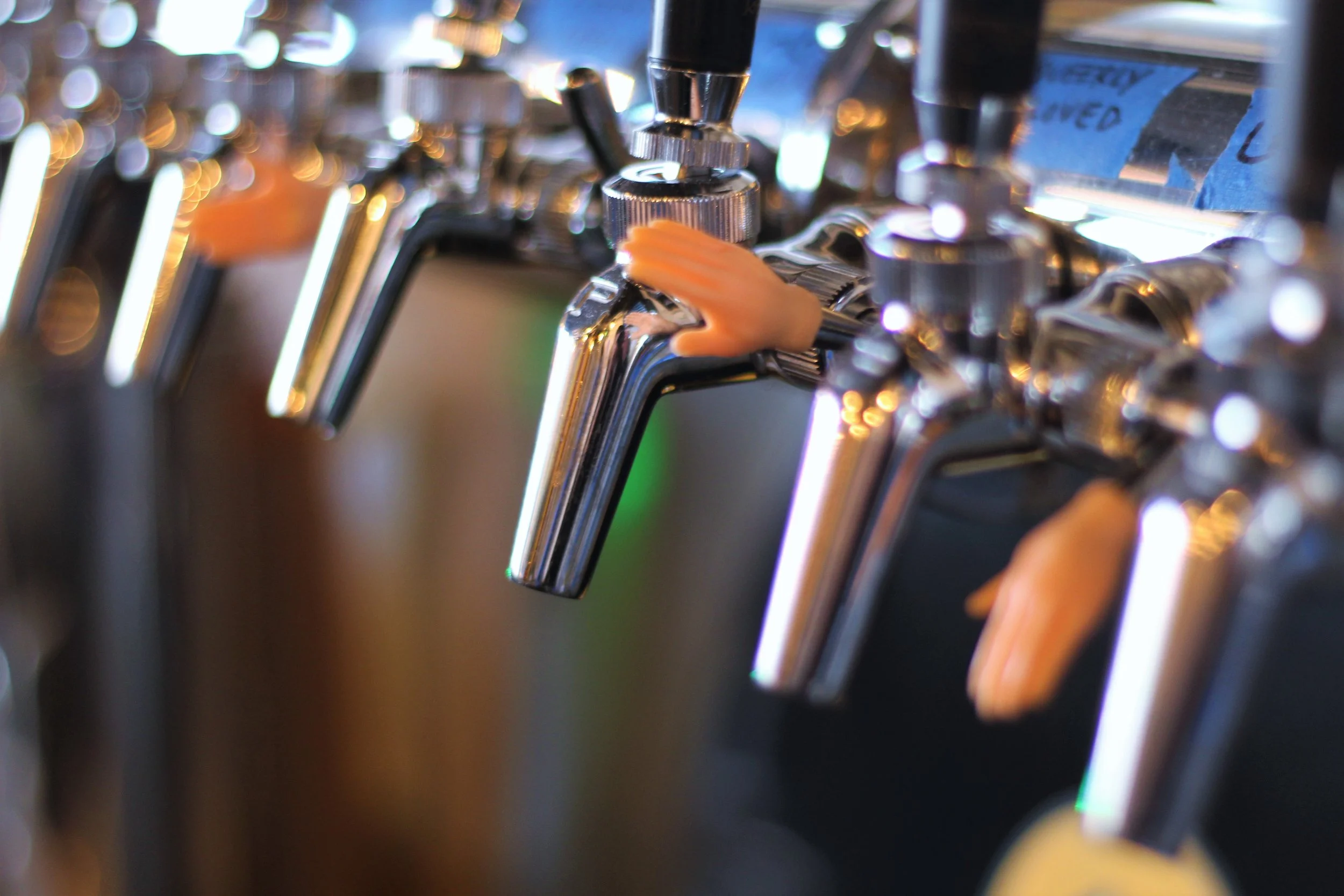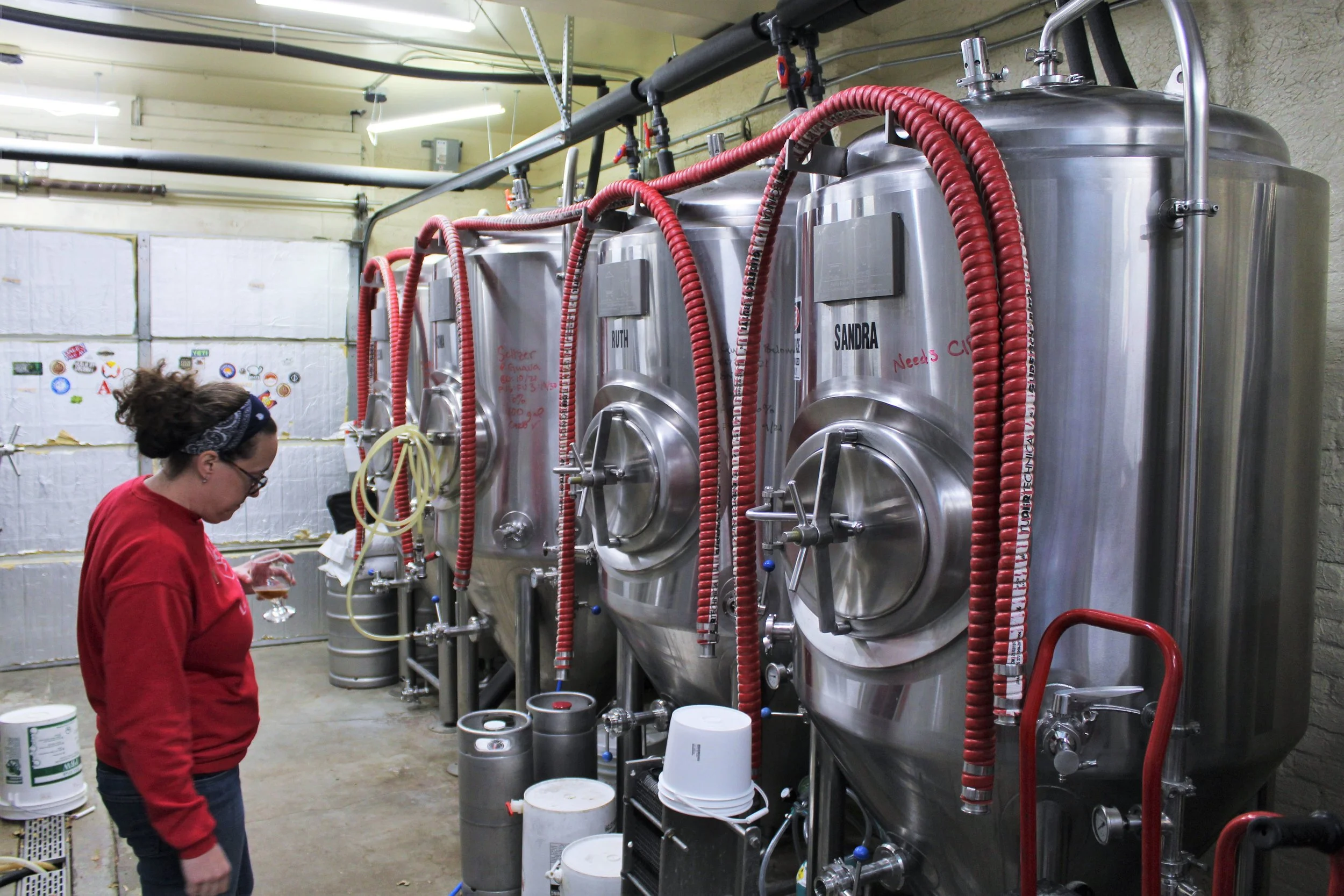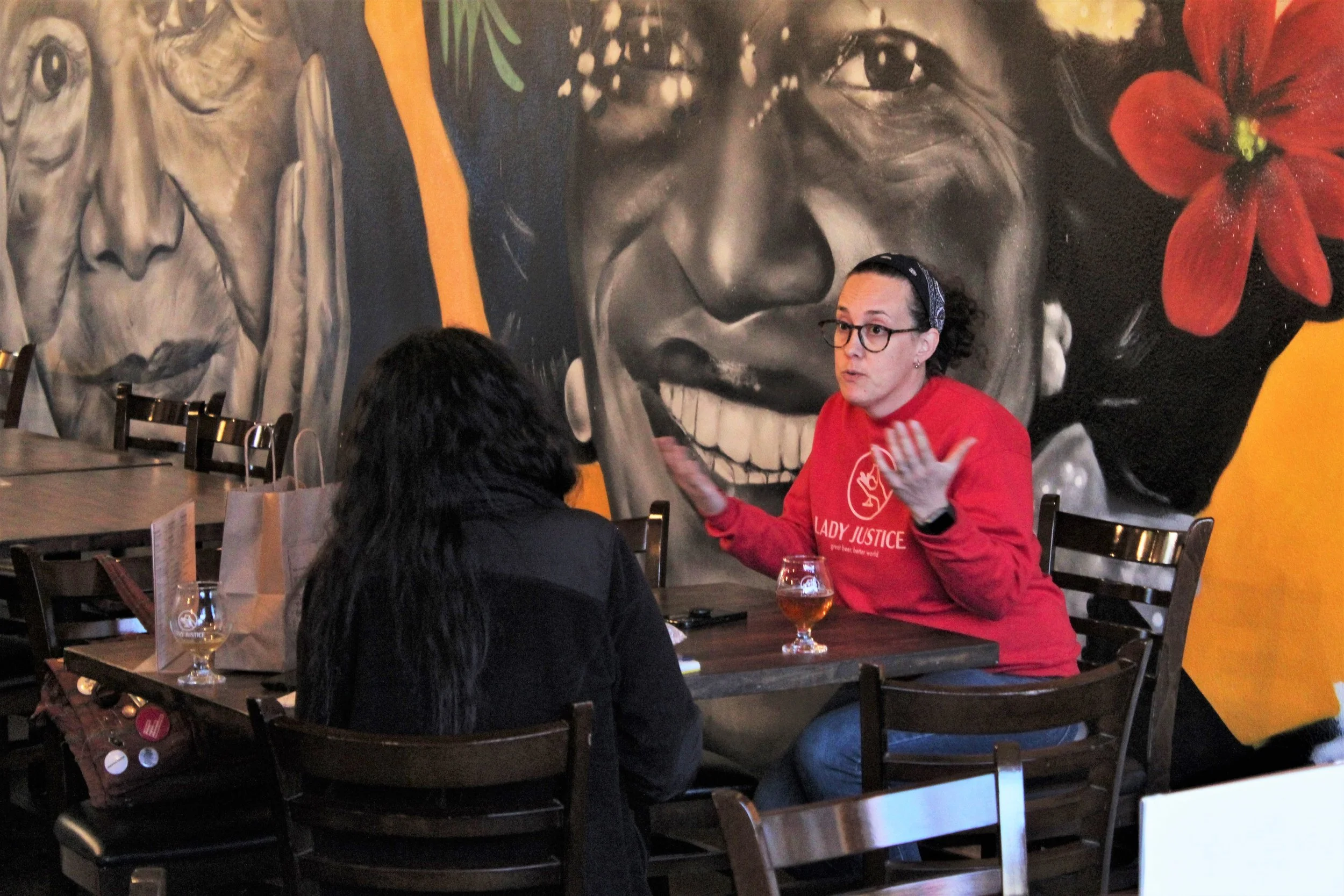Make Beer, Sell Beer, Make the World a Better Place — Lady Justice Brewing in Aurora, Colorado
Along one wall of Lady Justice Brewing’s taproom on East Colfax Avenue in Aurora, Colorado is a colourful mural with painted headshots of three figures: late liberal Supreme Court justice Ruth Bader Ginsburg; labour and civil rights activist Dolores Huerta; and late Black queer and trans rights activist Marsha P. Johnson, who played a major role in the Stonewall uprising in 1969. A large Pride flag faces the front door, and behind the bar are bulletin boards with quotes from the luminaries on the opposite wall. One from Dolores Huerta reads:
“Every moment is an organizing opportunity, every person a potential activist, every minute a chance to change the world.”
Photography by David Nilsen
The founders of Lady Justice take that mantra to heart. Their brewery is focused not only on brewing great beer (they do) and making their taproom a welcoming community space (it is) but on actively working toward a more just and equitable world. Opened as a fully philanthropic brewery in 2016, Lady Justice has used an evolving donation model to funnel funds to progressive causes around Colorado and used their platform to promote justice, equity, and inclusion not just in craft beer, but within the broader culture.
I sat down with co-founders Kate Power and Betsy Lay at a corner table near the open front windows of their taproom on a warm autumn day, and they told me the story of how their brewery came to be as we sipped their beers. It turns out a session just like this was the inception point for the project.
The idea for Lady Justice Brewing began as a joke over a round of after-work beers a decade ago. Betsy, Kate, and the third co-founder, Jen Cuesta, were all working for Americorps (a government agency that connects non-profits and their workers with people and communities in need) at the time, and they would meet up for beer to commiserate over the challenges of non-profit work, most significantly the lack of funding. “It would be great if our beer money could be helping these organisations,” one of them muttered. It was said mostly in jest, but the seed was planted, and in the following years, it grew into a workable business plan. They would brew beer, and they would donate the profits to the causes they cared about.
“We thought, ‘wouldn’t it be cool if we had a business where the funding was built-in?’” says Kate, who was in law school along with Jen when the business plan was coming together. “Make beer, sell beer, use the money from beer to make the world a better place!”
***
The model and focus of the brewery were so unique, it began getting buzz even before it opened. Because Kate and Jen were attorneys, the story got picked up by the American Bar Association’s blog, and attorneys across the country started joking about legal-themed beer names. And then something unexpected happened.
““It’s part of our mission to be there for women in the industry.””
The founders were contacted by the son of Sandra Day O’Connor, the first female associate justice of the Supreme Court, and he said his mom had seen the blog post and would give them permission to name a beer after her as long as it was her favourite style. Sandra Day IPA is still one of their core beers.
“That happened before we even opened, which was wild,” Betsy says. “That was our first recipe, a classic West Coast IPA.”
Other beer names like Chosen Family and Queerly Beloved have tipped a hat to the founders’ desire for a better world, but the real proof of their commitment is in the money they have donated since opening.
When Lady Justice was launched, it had no permanent taproom. Betsy, the head brewer, would brew batches of beer on a one barrel (119l) system in the tiny 300 square foot space they rented at the time, and the packaged beers would be released through CSB (Community Supported Beer) memberships. Members would pick up their allotment of each quarterly release, with 100% of profits from each quarter’s release would benefit a different non-profit assisting girls and women in Colorado. When the brewery was able to acquire its current taproom in 2020, it was time to rethink that model.
“One of the things that made our CSB membership so special in our first three years of operation was that it was super small batch and exclusive,” Betsy explains. “Exclusivity in our beer is not what we’re about—that’s kind of the opposite of what we’re about—but by default it had to be because we didn’t have a taproom. We had people signing up just so they could get beer other people couldn’t get.”
Once the taproom opened, allowing anyone to come enjoy their beers, donating 100% of profit across the board wasn’t sustainable. Instead, they’ve maintained the CSB and still release members-only beers to maintain exclusivity, and those profits are donated. Additionally, their Pouring Goodness program donates $1 from every pint of a chosen beer each month, which is donated to a different cause. Lady Justice was able to donate $8,000 (£6000) through their CSB alone in 2021.
“Since the business is not stagnant, it feels organic to let the donation models grow and evolve with Lady Justice,” Kate says.
Lady Justice split its CSB donations between two organizations in 2021—Front Line Farming, a Black woman-owned farm CSA in Denver; and the Girl Rising program at local Rangeview High School, which provided scholarships to help students pay for college.
Robyn Bristol, a social studies teacher, co-coordinates the Girl Rising program at Rangeview, and leads an annual field trip for girls to watch a documentary film, engage in team building exercises, and think about their roles within their community. She was thrilled when Lady Justice reached out about a scholarship donation.
““Make beer, sell beer, use the money from beer to make the world a better place!””
“As a social studies, history, and civics teacher, I really want my students to be able to see themselves in the curriculum, and see their future selves in the lessons we’re learning,” Robyn tells me. “For a company like Lady Justice to come in and be available, it really allowed our students to see themselves in those entrepreneurial roles in the future, and that’s what we’re striving for.”
***
When Brienne Allen began posting accounts of sexual harassment, discrimination, and assault from craft beer professionals on Instagram in May 2021, Lady Justice immediately announced they would be hosting a meeting for Denver-area beer professionals to share their thoughts and brainstorm ways to make the industry safer and more equitable.
“I heard a lot of people saying, ‘What do we do so action can happen?,’” Betsy recalls. “And I was like, shit, we have to be the ones to host this meeting. We just have to. We can’t ignore this. In my mind, if we hadn’t responded, we should have just closed our doors and walked away.”
Just days after that first Instagram post, a large group of Denver beer workers got together to begin addressing the issue. Lady Justice hosted a private meeting for women and non-binary folks first, then opened up a larger meeting for anyone who wanted to be involved. The meeting broke into small groups to develop action items for significant change.
Because of their previous work with Americorps, the Lady Justice founders felt uniquely suited to leading these discussions.
“I don’t think there are a lot of other breweries who have staff on hand to do this work,” Betsy says. “I knew it had to be Lady Justice, because we could. We still get bullshit sexist comments, but within Lady Justice, because we’re women-run, we’re a little more protected from the sexism and assault that a lot of other women in the industry face. I am able to talk about it and facilitate meetings around this from a space that is far less traumatic for me than it would be for other women in the industry.”
The group voted on the most-urgent needs: an anonymous, third-party reporting system, a system for accountability, and a commitment to spending as much money preventing harassment and assault as on parties and events. They also wanted the Colorado Brewers Guild to create a Diversity, Equity, and Inclusion (DEI) committee. Betsy is now on that committee, and is helping the Guild implement the first three priorities. Lady Justice is also hosting ongoing meetings every six weeks with the women who came for that first conversation.
“It’s happening,” says Betsy about positive change within her local beer scene. “It’s happening slower than anyone would want, but it’s happening.”
Betsy was hard at work on this issue before the topic blew up on social media last spring. Along with Andrew Copeland of Craft Beer Professionals, Julie Rhoads of Not Your Hobby Marketing, and the Safe Bars program, she created the P.A.C.T. Initiative (Promise of Awareness, Compassion, and Trust), which went public not long after Brienne’s initial post. The program requires breweries to make a commitment to becoming Safe Bars certified and abiding by the Safe Bars code of conduct.
“Not leading on this would have gone against who we are as a brewery,” Betsy says. “It’s part of our mission to be there for women in the industry. It’s a very tangible example of the work we’re trying to do.”
***
Considering the significant leadership role Lady Justice has played in the Colorado beer scene, and the national and international press they’ve received for their business model and outspoken activism—they were even featured on CBS Mornings in 2021, a nationally televised network talk show—it might be a surprise to learn they brewed just under 200 barrels (24,000l) of beer last year. Their small taproom seats only 45, and their cans—filled on a canning line they share with fellow woman-and-queer-owned Goldspot Brewing—are in fewer than a dozen stores around the Denver area.
Betsy sees the dichotomy between her brewery’s elevated renown and its diminutive production as both a blessing and a challenge.
“We’ve had national coverage since day one,” she explains. “How do we balance this thing that’s happening to us with maintaining a robust taproom for the community?”
It’s not a question with an easy answer, especially since the brewery is facing a classic problem for any small business: they need to make more money in order to grow, but they need to grow in order to make more money. Currently, Betsy is not only doing all the brewing herself, but also the packaging, sales, and distribution, as well as serving as an ad hoc general manager for the taproom. She doesn’t have time to do much in terms of sales or deliveries and needs to hire more employees to free up time. But that takes more beer.
“I think we could increase production pretty significantly with one or two more people in the brewhouse, or someone in sales and distro,” she says. “But we can’t afford more help till we increase distribution, and we can’t increase distribution till we can hire more help.”
For the time being, Lady Justice is the Little Engine that Could, sparking critical conversations across the craft beer world while brewing 180 barrels (21,000l) of beer a year on a seven barrel (830l) system. It helps that the beer is so good. Sandra Day IPA is snappy and moderately bitter, with a clean malt flavour and classic hop notes of pine and citrus pith. Sitting in the bright taproom, laughing with Kate and Betsy, it felt like the perfect beer for the moment—so good I kept wanting another sip, but so laid back it never distracted from our conversation.
After Kate and Betsy left that day, I sat and sipped on Queerly Beloved, a collaboration with Goldspot Brewing and Big Rip Brewing, a queer-owned, woman-owned brewery in Kansas City. This Blonde Stout was brewed with Cholaca cacao and coffee from local Huckleberry Roasters, and gave me the pleasant impression of a white chocolate mocha, with creamy coffee, mild milk chocolate, and touches of hazelnut.
“Our beer is not hard to sell,” Betsy says while discussing her plans for getting her beer into more stores and bars. “Most of our clients have reached out to us. I think it’s the reputation of the beer itself in addition to the reputation for what we do for our community and our giving model. We don’t get turned down very often.”
These founders of Lady Justice Brewing don’t back down either. They’re brewing great beer, and they're using the platform of that beer to push for meaningful change both inside and outside the craft beer world. As Kate said, they aren’t just making beer. They’re making the world a better place.


